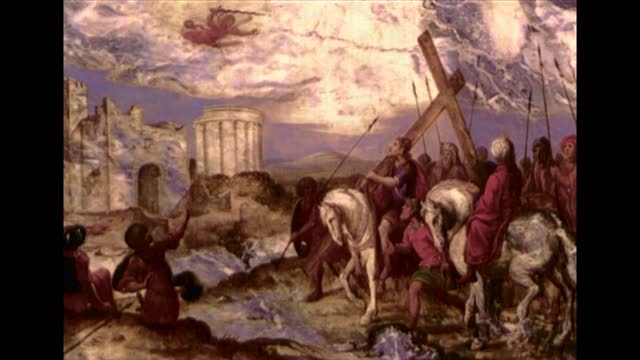Premium Only Content

Recuperatio Verae†Crucis ad Ierusalem a Flavio Heraclio Augusto per Imperium Romanum (3 Mai. 629)
Recuperatio Verae†Crucis ad Ierusalem a Flavio Heraclio Augusto per Imperium Romanum (3 Mai. 629)
Beginning about the seventh century, the Gallican Church, celebrated the Feast of the Cross on May 3. The Feast of the "Invention of the True Cross" commemorates the recovery by the Roman (Byzantine) Emperor Heraclius, of a portion of the Holy Cross on 3 May 629, after it fell into the hands of the Persians. According to Herbert Thurston:
[T]he portion of the Holy Cross preserved in Jerusalem afterwards fell into the hands of the Persians, but was recovered and,...was solemnly brought back to Jerusalem on 3 May, 629. This day seems to have attracted special attention among Celtic liturgists in the West and, though disregarded in the East, has passed through Celtic channels (we meet it first in the Lectionary of Silos and in the Bobbio Missal) into general recognition under the mistaken title of "Invention of the Cross.
The commemoration of the "Invention of the True Cross', particularly popular in the historical Gallican Rite of the Catholic Church. was kept by the Western Church on 3 May.
The feast of the Exaltation of the Cross sprang into existence at Rome at the end of the seventh century. Allusion is made to it during the pontificate of Sergius I (687-701) but, as Dom Bäumer observes, the very terms of the text (Lib. Pontif., I, 374, 378) show that the feast already existed. It is, then, inexact, as has often been pointed out, to attribute the introduction of it to this pope. The Gallican churches, which, at the period here referred to, do not yet know of this feast of the 14th September, have another on the 3rd of May of the same signification. It seems to have been introduced there in the seventh century, for ancient Gallican documents, such as the Lectionary of Luxeuil, do not mention it; Gregory of Tours also seems to ignore it. According to Mgr. Duchesne, the date seems to have been borrowed from the legend of the Finding of the Holy Cross (Lib. Pontif., I, p. cviii). Later, when the Gallican and Roman Liturgies were combined, a distinct character was given to each feast, so as to avoid sacrificing either. The 3rd of May was called the feast of the Invention of the Cross, and it commemorated in a special manner Saint Helena's discovery of the sacred wood of the Cross; the 14th of September, the feast of the Exaltation of the Cross, commemorated above all the circumstances in which Heraclius recovered from the Persians the True Cross, which they had carried off. Nevertheless, it appears from the history of the two feasts, which we have just examined, that that of the 13th and 14th of September is the older, and that the commemoration of the Finding of the Cross was at first combined with it.
#TrueCross #Heraclius #Jerusalem
Ago tibi gratias Deo per instrumenta de Tevvez pro bono rei publicae.
-
 4:14
4:14
ProVaticanus
1 day agoPax ΧΡ+SPQR+SRE+ per verba et acta Theodosii Magni pro unificatione (394-395 A.D.) #ProVaticanus
8 -
 3:01:51
3:01:51
Right Side Broadcasting Network
12 hours agoWATCH: NASA’s SpaceX Crew-10 Launch
111K45 -
 2:06:17
2:06:17
Glenn Greenwald
11 hours agoJudge Orders Hearing on Columbia Student Deportation Case; Is the Ukraine Ceasefire Plan Serious? Trump Attacks Thomas Massie for His Budget Vote | SYSTEM UPDATE #422
125K176 -
 47:16
47:16
BonginoReport
13 hours agoTrump-Elon Bromance Triggers The Libs (Ep.03) - 03/12/2025
157K281 -
 4:03:41
4:03:41
Barry Cunningham
14 hours agoTRUMP DAILY BRIEFING: PRESIDENT TRUMP PRESS CONFERENCE | DEMOCRATS IN PANIC!
103K98 -
 1:56:30
1:56:30
Melonie Mac
12 hours agoGo Boom Live Ep 40!
59K9 -
 1:58:30
1:58:30
Kim Iversen
12 hours agoDOGE, Trump, Aliens and Remote Viewing: A Deep Dive into the Unknown
75K73 -
 1:20:08
1:20:08
Redacted News
13 hours agoPutin smells a TRAP as Ukraine agrees to Trump's U.S. ceasefire plan | Redacted w Clayton Morris
183K180 -
 51:59
51:59
Candace Show Podcast
14 hours agoMahmoud Khalil’s Detainment: Fighting Terrorism Or Speech? | Candace Ep 158
135K477 -
 7:43:31
7:43:31
Dr Disrespect
17 hours ago🔴LIVE - DR DISRESPECT - PUBG - PRO TACTICALLY WINNING
179K19